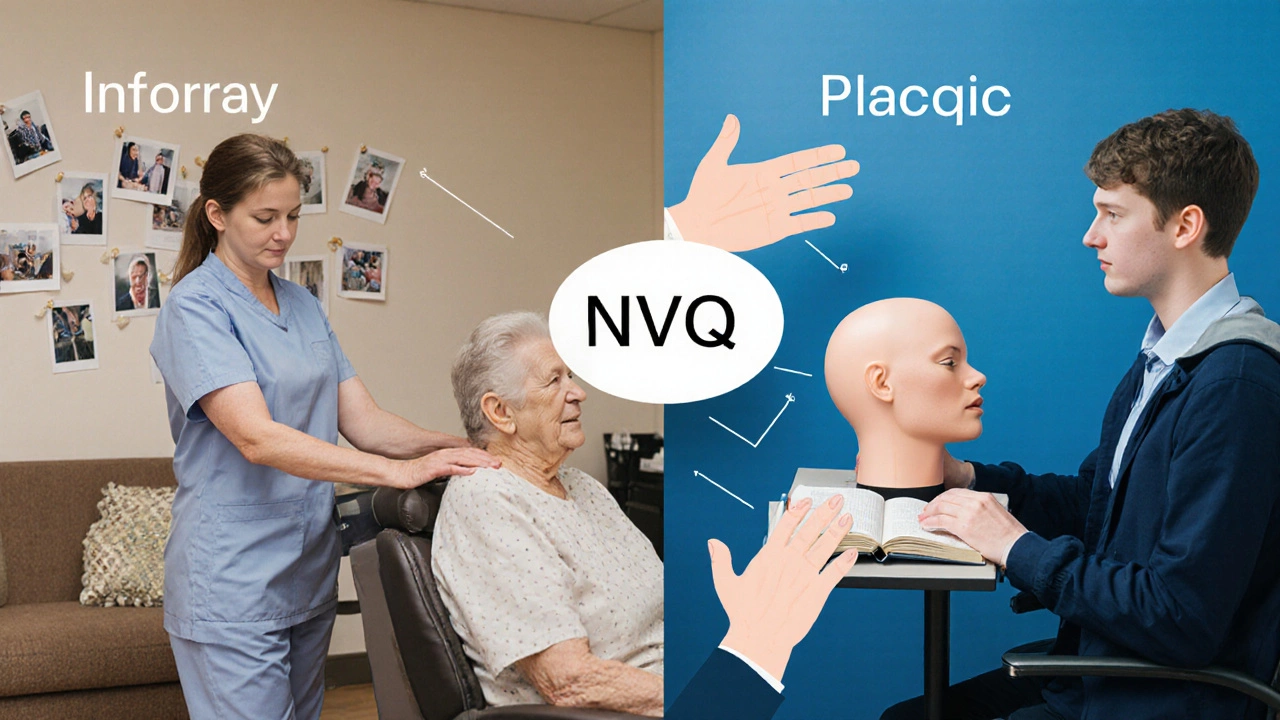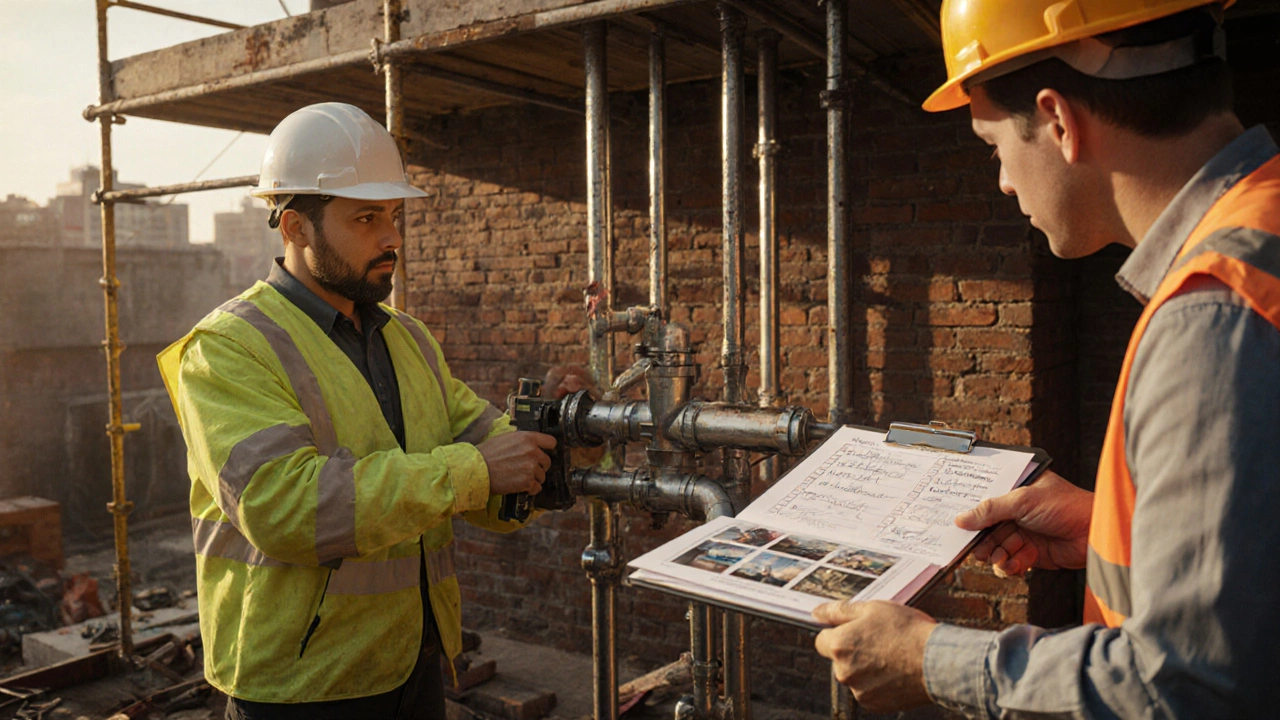NVQ vs Diploma Qualification Selector
Find the right qualification for your career path
This tool helps you determine whether an NVQ or Diploma is more suitable for your situation based on your career goals, current employment status, and other factors.
Your Career Profile
Recommended Qualification
Why this recommendation?
NVQ
Best for working professionals
Assessed in workplace
Often free or low-cost
Diploma
Best for students
Assessed in classroom
Better for theory-based roles
People often ask if an NVQ is the same as a diploma. The short answer? No. They’re not the same, even though they both count as vocational qualifications in the UK. Confusion happens because both are used to prove skills in real-world jobs - like construction, health care, or hairdressing. But how they’re built, assessed, and recognised are totally different.
What Is an NVQ?
An NVQ stands for National Vocational Qualification. It’s a work-based qualification you earn by showing you can do a job properly, not by sitting exams. Think of it like learning to drive: you don’t pass by writing a test about brakes - you pass by actually braking safely in traffic.
NVQs are built around real tasks. If you’re doing an NVQ in plumbing, your assessor will watch you fit a radiator, check your gas safety records, and ask you to explain your process. You build a portfolio of evidence - photos, witness statements, signed checklists - over weeks or months. There’s no final exam. You’re graded on what you can do, not what you can remember.
NVQs come in levels: Level 1 (basic), Level 2 (competent worker), Level 3 (supervisor or senior role), up to Level 5 (managerial). Most people in trades like electrical work or care homes aim for Level 2 or 3. These are the ones employers actually look for.
What Is a Diploma?
A diploma is more like a traditional course. You attend classes, study theory, take written exams, and sometimes do a short practical project. Diplomas are often offered by colleges and can cover everything from business management to beauty therapy.
For example, a Level 2 Diploma in Hairdressing might include units on shampooing techniques, client consultation, and health and safety rules. You’ll sit a written test on chemical reactions in hair dyes and do a practical assessment where you cut a model’s hair. It’s a mix of book learning and hands-on practice.
Diplomas are usually completed faster than NVQs - often in a few months. They’re great if you’re still in school or training full-time. But if you’re already working and need to prove your skills on the job, a diploma won’t always be enough.
Key Difference: How You’re Assessed
This is where the biggest gap shows up.
NVQs are assessed in the workplace. You’re observed doing your actual job. Your assessor comes to your site - a construction yard, a care home, a salon - and watches you work. You collect evidence over time. It’s real-world proof.
Diplomas are assessed in the classroom. You sit exams. You hand in essays. You do a controlled practical test, often on a dummy head or a training mannequin. The environment is controlled. The pressure is different.
Here’s the thing: if you’ve been working as a kitchen fitter for five years but never took a formal course, you can get an NVQ by proving what you already know. You can’t do that with a diploma. A diploma asks you to learn something new. An NVQ asks you to prove you’ve already learned it.

Which One Do Employers Want?
It depends on the job.
In construction, you’ll need an NVQ to get a CSCS card. No NVQ? No site access. Electricians, plumbers, and scaffolders all require NVQ Level 2 or 3. That’s not optional - it’s law.
In health and social care, many employers accept either, but NVQs are preferred because they show you can handle real clients, not just theory. A care home manager doesn’t care if you passed a written test on dementia care - they care if you’ve actually de-escalated a crisis with a resident.
For roles like receptionist, admin assistant, or junior marketer, a diploma might be enough. These jobs value broad knowledge over hands-on proof.
Bottom line: if the job involves physical tasks, safety rules, or direct client contact - go for the NVQ. If it’s more about communication, systems, or theory - a diploma might do.
Can You Get Both?
Yes, and many people do.
Some colleges offer combined courses - like a Level 3 Diploma in Health and Social Care that includes NVQ units. That way, you get the classroom learning and the real-world proof in one package.
Others start with a diploma to learn the basics, then switch to an NVQ to get certified for work. For example, someone might finish a Level 2 Diploma in Beauty Therapy, then do an NVQ Level 2 while working in a salon to get their official qualification.
It’s not about which is better. It’s about which fits your situation.
What About Funding and Costs?
NVQs are often free or low-cost if you’re employed. Many employers pay for them because they need certified staff. If you’re on benefits or under 24, you might get full funding through the government.
Diplomas usually cost more. A Level 2 Diploma at a college can run £500-£1,500. But you might get student finance or an Advanced Learner Loan if you’re over 19.
One big advantage of NVQs: you can do them while working. You don’t need to quit your job. Diplomas often require full-time study - unless it’s a part-time evening course.

Is One More Recognised Than the Other?
In the UK, both are recognised by Ofqual - the official regulator of qualifications. That means legally, they’re equal.
But perception matters. In skilled trades, NVQs are the gold standard. You’ll see them listed in job ads: “Must hold NVQ Level 3 in Electrical Installation.” You won’t see “Diploma in Electrical Installation” on those listings.
Outside trades, diplomas are more common. Universities and employers in admin, education, or retail often list diplomas as entry requirements.
So recognition isn’t about which is better - it’s about which is expected in your field.
What Happens If You Have a Diploma but Need an NVQ?
You can bridge the gap.
Many training providers offer “NVQ top-ups” for people who already have a diploma. You don’t start from scratch. You just gather evidence for the practical parts you didn’t cover.
For example, if you did a Level 2 Diploma in Childcare but never worked in a nursery, you’d need to complete the NVQ units that require you to support children in a real setting. Your assessor will guide you through this.
It’s not a second qualification - it’s filling the missing piece.
Final Verdict: NVQ vs Diploma
Don’t think of them as rivals. Think of them as different tools.
- Choose an NVQ if you’re working in a trade, want to get certified for site access, or need to prove you can do the job right now.
- Choose a dipoma if you’re studying full-time, want broad knowledge, or need a qualification to get into a job that’s more theory-based.
Both open doors. But if you’re in construction, care, or skilled trades - the NVQ is the key that turns the lock.
Can I get an NVQ without a job?
It’s very hard. NVQs require you to be observed doing real work. If you don’t have a job, you might be able to do one through a college placement or apprenticeship. But you can’t just sign up and complete it at home.
Is an NVQ higher than a diploma?
Not necessarily. Both can be at Level 2, Level 3, or higher. The difference isn’t in level - it’s in how you earn it. A Level 3 NVQ and a Level 3 Diploma are equal in status, but they’re earned in different ways.
Do NVQs count as UCAS points for university?
Most don’t. NVQs are vocational and not designed for university entry. If you want to go to uni, you’ll usually need A-levels, a BTEC, or a Level 3 Diploma that’s listed on the UCAS tariff. Some universities accept NVQ Level 3 in specific subjects, but it’s rare. Check directly with the course you’re applying to.
Can I do an NVQ online?
You can do some parts online - like watching videos, submitting photos, or writing reflective logs. But you still need to be observed doing the actual job. You can’t complete an NVQ entirely remotely if your role requires hands-on skills.
How long does an NVQ take to complete?
It depends on your experience and how much time you can dedicate. Most Level 2 NVQs take 6 to 12 months. Level 3 can take 12 to 18 months. If you’re already skilled, you might finish faster. If you’re learning as you go, it could take longer.





Write a comment